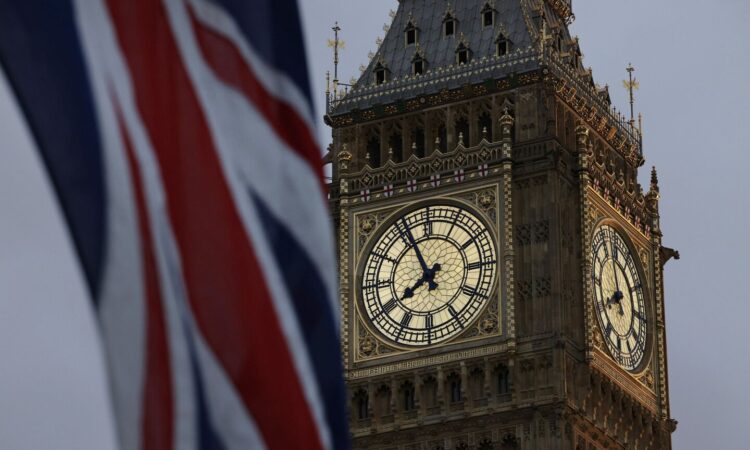
Although the recent fall in energy prices will provide some relief, this will unfortunately also reduce tax receipts from energy firms. Trouble is there are a lot of hungry chicks all calling out to be fed, not the least of which is Defense Minister Ben Wallace calling for an additional £11 billion pounds ($13 billion) to fulfill the country’s NATO commitments. But all chancellors like to have a few rabbits to magically pull from their red boxes — budgets are about politics as much as economics.
This budget is really the template for the next election, which is due by January 2025. Both Hunt and Prime Minster Rishi Sunak know this is probably their last realistic chance to gain any momentum for retaining power, with the Labour Party well ahead of the Conservatives in opinion polls. But ballooning government debt and the highest tax levies in several decades make it hard to to reinvigorate the economy and combat rising prices. Inflation is still in double digits, and a cost-of-living crisis is prompting widespread industrial action. There’s no cake to be handed out — barely even crumbs.
Sunak laid out five goals for this year, and the first three must be addressed in this budget.
The first — halving inflation — is probably the easiest to achieve, albeit with the heavy lifting being done away from Downing Street and Westminster. Although consumer prices rose by 10.1% annually in January, the Bank of England expects this to be down to 4% by year end. There was some promising news in the latest CPI release, particularly in core and services prices.
But Hunt can implement a couple of fairly cost-effective measures to hasten the drop in headline price gains, which may have the added benefit of easing wage negotiations with striking public-sector unions. Almost certainly he will waive a planned rise in fuel duty, copying the playbook of previous chancellors.
The most effective tool he has is an extension of the Energy Price Guarantee, the central plank of Truss’s short-lived tenure, which caps average annual household energy bills at £2,500. Hunt has planned to lift it to £3,000 but that seems pointless now. The Resolution Foundation think-tank points out bills will fall below the current cap by July. It will likely only cost a few billion pounds to accumulate a lot of political capital. The big advantage for Hunt, according to Bloomberg’s Senior UK Economist Dan Hanson, is that this measure alone will shave 2.2 percentage points from April’s inflation gauge.
The second of Sunak’s pledges is to grow the economy, something the OBR, the BOE and the International Monetary Fund all see as being a tough task this year. It is all very well UK lawmakers criticizing the IMF for forecasting the that UK will be the only G7 economy to contract this year, but Hunt has to respond with measures that give growth a fighting chance. Recognizing the difficulty, the government has given itself a specific target of improving quarter-on-quarter growth in the final three months of this year.
With the corporate tax rate set to jump to 25% from 19%, some clever growth incentives are desperately needed. AstraZeneca Plc’s decision to build a new plant in Ireland rather than Britain highlights the big risks the government is taking by raising taxes in a flatlining economy. Replacing the super-deduction tax breaks on capital investment — scheduled to expire next month — with something that incentivizes corporates to increase rather than reduce capital spending should be a priority.
Sunak’s third pledge is to make sure the national debt is falling. It’s likely that government bond issuance for the next financial year, released with the budget, will be reduced by from its current £306 billion due to the cost of energy subsidies plummeting. Gilt market expectations are for around £275 billion. It’ll still be comfortably the largest net amount on record to be digested, as the BOE also plans to sell around £80 billion of its debt holdings. The Treasury is expected to raise the amount of short-dated bills sold, as well as increasing National Savings bonds sold directly to retail investors.
The budget is likely to repeat the sleight of hand we saw in Hunt’s financial statement in November, when extensive spending cuts were delayed into the outer years of his five-year horizon, conveniently past the next election. Boosting near-term spending now is probably the smart and only move, albeit disingenuous because it can only be backfilled by restraint in the medium-term. The OBR’s latest projections will be released at the same time as the budget: They’ll probably show a slightly better backdrop for this year, but worse further out.
This rearranging of deckchairs won’t alter the overall picture that a lot more government debt sales are coming. The 10-year gilt yield has risen nearly 50 basis points to around 3.5% since early February, illustrating how sensitive investors remain after the debacle of the previous Chancellor Kwasi Kwarteng’s tax-slashing in late September saw yields blow out to ridiculously high levels.
Fiscal prudence is the hallmark of the Hunt-Sunak combo, and maintaining that impression is vital for any of the first three of their goals to have a hope of being achieved. A little is going to have to go a long way if Hunt’s inaugural budget is to be anything other than a passing irrelevance.
More From Bloomberg Opinion:
• Nicola Sturgeon Was the Tories’ Best Foil. Not Anymore: Therese Raphael
• The UK Consumer Nightmare That Never Was: Andrea Felsted
• Liz Truss Might Have the Last Laugh Yet: Martin Ivens
This column does not necessarily reflect the opinion of the editorial board or Bloomberg LP and its owners.
Marcus Ashworth is a Bloomberg Opinion columnist covering European markets. Previously, he was chief markets strategist for Haitong Securities in London.
More stories like this are available on bloomberg.com/opinion






